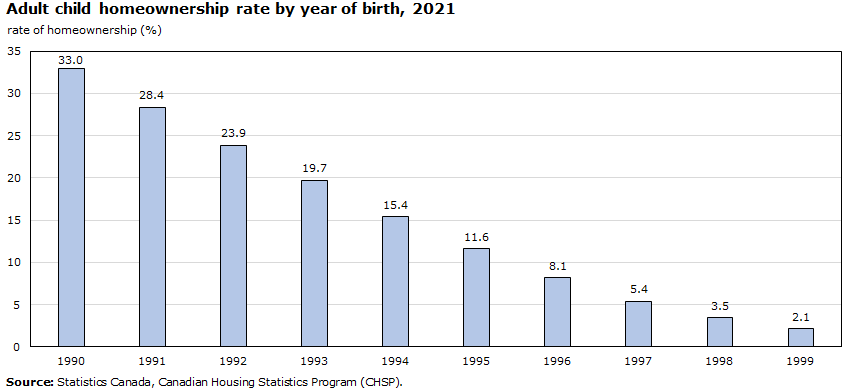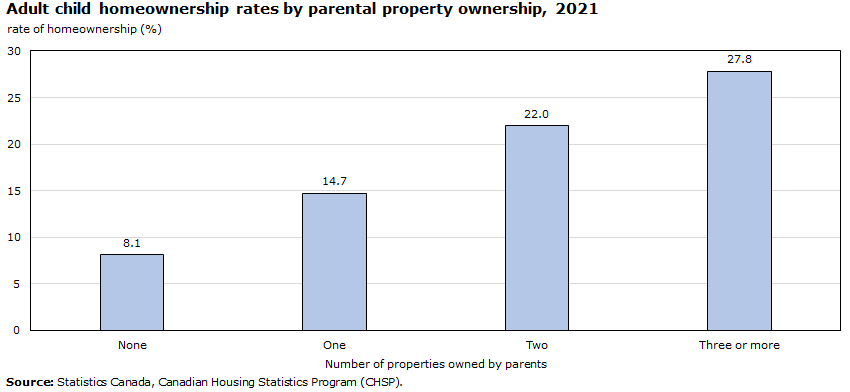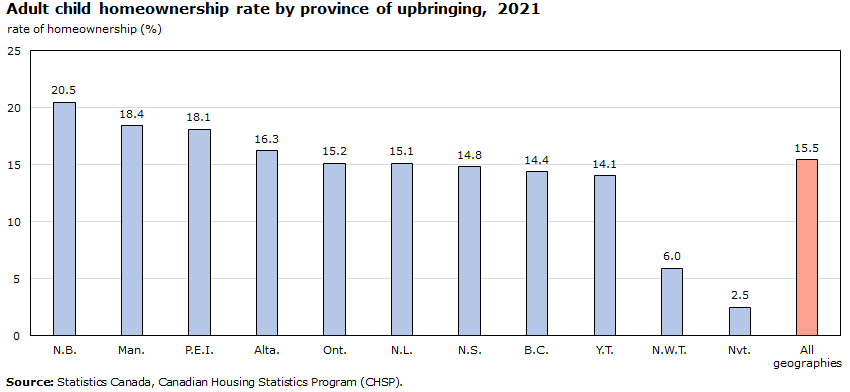If parents own a home, children more likely to as well
At a glance (3 minute read)
- Children born in the 1990s with parents owning a home are twice as likely to own a home themselves, and those with parents owning multiple properties are three times more likely to be homeowners.
- The national ownership rate for this age group (23-33) is 15.5 per cent, with older adult children owning at a higher rate due to factors like education, income, and family formation.
- Income levels play a significant role, with higher incomes associated with higher homeownership rates; parental property ownership positively influences adult children's likelihood of homeownership across income, age, and location, as revealed in the study.

Young adults born in the 1990s whose parents own a home are twice as likely to own a home than non-homeowners, according to a new Statistics Canada study.
Adult children whose parents own multiple dwellings are nearly three times more likely to be homeowners than those whose parents were non-homeowners, even when the multiple dwellings are cabins or investment condominiums.
The study, which used tax data and data from the federal Canadian Housing Statistics Program, looked at homeownership rates for those born in the 1990s (ages 23-33), income levels, and provinces.
Key findings
Children of parents who own and don’t own properties
- Adult children of non-homeowners had a homeownership rate of 8.1 per cent.
- Adult children of homeowners (with any number of properties) had a homeownership rate of 17.4 per cent, making them more than twice as likely to own a home.
- Adult children of multiple-property owners had a homeownership rate of 23.8 per cent – triple the rate for the adult children of non-homeowners.
Additionally, the majority (52.8 per cent) of adult children who owned multiple properties had parents who also owned multiple properties in 2021.
Age
The national ownership rate for this age group (ages 23-33) is 15.5 per cent.
- The oldest adult children in the survey, born in 1990 (31 years old in 2021), owned at a rate of 33 per cent.
- Those born in 1994 owned at a rate of 15.5 per cent.
- Those born in 1999 owned at a rate of 2.1 per cent.
Older adult children owned at a higher rate because they had:
- higher average educational attainment and therefore access to better jobs;
- more time in the labour market and higher incomes;
- longer periods for saving;
- higher rates of family formation or cohabitation; and
- access to the property market sooner.

Income levels
The average income:
- of non-owners was $36,000 (with a median of $31,000);
- of homeowners $65,000 for homeowners (with a median of $59,000); and
- was $6,000 higher for the adult children of multiple-property owners than for those of non-homeowners.
Adult children (ages 23-31) with incomes less than $40,000 had significantly lower chances of being homeowners than those earning $40,000 to $80,000 or over $80,000.
The exception: adult children in the lower income group with parents who owned three or more properties had a higher likelihood of homeownership (26.7 per cent) than the adult children in the middle income group whose parents were not homeowners (21 per cent).
Higher incomes are associated with higher homeownership rates at all levels of parental property ownership, reflecting the importance of higher incomes in attaining homeownership.

Location
- The rate of homeownership for those born in the 1990s in British Columbia with just 14.4 per cent of young-adult children owning a property.
- In contrast, 20.5 per cent of young adults in New Brunswick own a home and 18.4 per cent in Manitoba own a home.

Summary
"Parental property ownership is positively associated with their adult children's likelihood of home ownership when the adult children's income, age and province of residence are held constant," according to the study.
This study is among the first to measure intergenerational housing outcomes. It’s part of a series. New surveys and reports will be forthcoming.
Homeownership rate, Canada-wide
In 2021, the homeownership rate Canada-wide 66.5 per cent, a decrease of 2.5 per centage from 69 per cent in 2011.
In BC, the homeownership rate fell 3.2 per cent in 2021 to 66.8 per cent from 70 per cent in 2011.
Government intervention
Many young Canadians have lost hope in ever buying a home. A recent Ipsos Reid poll found that almost more than six in ten (63 per cent) Canadian renters believe “owning a home is now only for the rich.”
To help potential home buyers and owners, the federal and provincial governments have introduced various grants and rebates over the years. Here’s our list.
Read the study, Parents and children in the Canadian housing market (opens 14-page pdf).
If you have questions about this study, contact Harriet Permut, director of government relations at hpermut@rebgv.org.